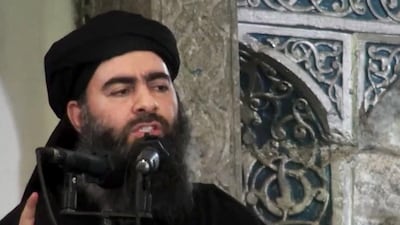Since the killing of Abu Musab Al Zarqawi in 2006, the leaders of ISIL and of its previous incarnations have rarely made public appearances or statements. Throughout the past decade, only the current leader (though some say he was recently killed), Abu Bakr Al Baghdadi, has appeared in public. And he did so three years ago only because of the great necessity of being publicly known in order to claim the title of "caliph".
The last time he made an audio statement was in November, when he ordered members of his group to stand and fight in Mosul until the end, which they did before they were forced out of the symbolic stronghold after nearly nine months of brutal fighting. He did not do the same after the battle to liberate Raqqa, the second pillar of his so-called caliphate, began last month.
His silence today raises questions from his supporters and his enemies alike. ISIL has lost Mosul and is on its way to lose Raqqa. Al Baghdadi's silence surely adds to the confusion of the group’s supporters who are witnessing a crash from the highs of 2014. If there ever was an urgent time for Al Baghdadi to address his followers, one would think it is now.
His absence at such a critical moment has led to speculation about his death, his whereabouts and his relevance.
On Tuesday, General Stephen Townsend, the commander of Operation Inherent Resolve, touched on these themes in answer to a question about whether Al Baghdadi’s death matters. “It'd make me feel better to know that he was dead,” the general said. “I suppose it probably doesn't really matter.”
Gen Townsend is right. Al Baghdadi’s death may affect the morale of the group, and lift the morale of its enemies, but it would matter little. It would have minimal impact on the organisation. Indeed, his death before the full decline of the so-called caliphate he established might even turn him into a martyr in the eyes of his supporters.
ISIL has learned from past experience -- its own as well as that of other jihadist groups -- that leaders should be dispensable. Many armed groups in Syria, for example, weakened and died out slowly after the demise of their charismatic leaders. Since the elimination of Zarqawi in 2006 and later his successor, Abu Omar Al Baghdadi, alongside his deputy, Abu Ayyub Al Masri, in 2010, the group has sought to minimise the impact of such operations on the core of the organisation and its ability to survive.
The fate of ISIL does not depend on the survival of Al Baghdadi. In its own writings, the group suggested that a “charismatic” leadership could be manufactured to serve as the face of the organisation without the group depending on those leaders for its day-to-day operations.
After the death of Al Baghdadi, no successor needs to have the same religious and supposed family credentials -- as a PhD graduate in Islamic studies and purported descendant of Prophet Mohammad. For ISIL's supporters, Al Baghdadi established a caliphate and its legitimacy is forever tied to him, not on his successor. His lineage was cited to support the declaration of such a project, which could be continued under the leadership of any person as long as they can claim to be pious and capable leaders.
Thus, the death of Al Baghdadi before the complete collapse of the so-called caliphate could seal his legacy as a founder. He could be presented as the leader who brought the organisation back from the abyss in 2010, when it had been significantly weakened, to become a successful organisation that carved out one third of Iraq and half of Syria and arrogated to him the title of caliph.
If he dies after his group is completely defeated, that will damage his leadership and discredit his project. If he dies on that note, however, he could be just the ideal leader to present for future propaganda. Since its rise in 2014 and before, the group has focused on presenting its founders as visionaries and as capable leaders.
Al Baghdadi, with his religious credentials, is rare among jihadists. It will be difficult for ISIL to find a similar successor. His death would be regardless as another victory and a source of relief for the group’s enemies and victims. ISIL, however, could settle with less. It could replace him with someone with a lower profile, with minimal impact, if any, on its ability to function as an organisation.
For almost a year, the group has emphasised in its own publications that its new leaders have successfully taken over different roles in the organisation after the killing of many of its long-standing leaders since the US-led campaign began in the summer of 2014.
The takeover by new leaders, in the words of both ISIL and American officials, caused little disruption to the group’s ability to manage an expansive battlefield. Al Baghdadi’s demise will have a similarly negligible impact on ISIL.
Hassan Hassan is a senior fellow at the Tahrir Institute for Middle East Policy and co-author of ISIS: Inside the Army of Terror

